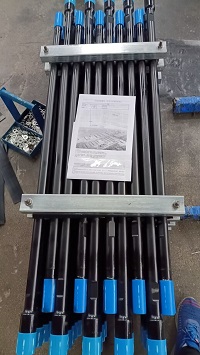Abstract:The extraction of clean and abundant groundwater is a critical component of global water resource management. To achieve...
The extraction of clean and abundant groundwater is a critical component of global water resource management. To achieve this, efficient and reliable water well drilling tools play a pivotal role. Among these tools, Extension Drilling Tools have emerged as essential assets in enhancing the drilling process, improving productivity, and ensuring the sustainability of water supply systems.

Extension Drilling Tools: Extension drilling tools are instrumental in overcoming challenges associated with drilling deep water wells. These tools provide added length to the drill string, allowing drilling operations to reach greater depths. They are designed to maintain the integrity and precision of the drilling process while extending the reach of the drilling equipment.
Enhancing Depth Capabilities: Traditional drilling methods often face limitations in reaching deeper aquifers. Extension drilling tools address this challenge by providing the necessary length to access water sources at greater depths. This is crucial in regions where groundwater resources are abundant but located deep underground.
Versatility in Drilling: Extension drilling tools are adaptable and compatible with various drilling techniques, including rotary, cable tool, and percussion drilling. Their versatility makes them suitable for a wide range of geological conditions, ensuring that drilling projects can proceed efficiently regardless of the subsurface complexities.
Optimizing Productivity: By enabling deeper drilling, Extension Drilling Tools contribute to increased productivity in water well construction. Deeper wells can yield larger volumes of water, benefiting communities, agriculture, and industries that rely on groundwater as a primary water source.
Sustainability and Access: Extension drilling tools play a vital role in achieving sustainable water supply systems. As shallower aquifers become depleted, accessing deeper groundwater sources becomes essential. By providing access to these deeper reserves, extension drilling tools help prevent over-extraction of shallow aquifers, reducing the risk of groundwater depletion.
Cost-Effective Solution: Extension drilling tools offer a cost-effective solution for accessing deep groundwater. They eliminate the need for costly and time-consuming drilling of multiple shallower wells to achieve the desired water supply. This not only reduces drilling expenses but also minimizes the environmental impact associated with drilling activities.
Monitoring and Maintenance: Water well construction is not a one-time endeavor; it requires ongoing monitoring and maintenance. Extension drilling tools, when used in combination with modern well design and construction techniques, facilitate easier access for maintenance and rehabilitation efforts, ensuring long-term sustainability.
Geological Insights: Extension drilling tools also provide geological insights into subsurface formations. As they penetrate deeper layers of the Earth, they collect valuable geological data that can inform further exploration and groundwater management strategies.
Challenges and Considerations: While extension drilling tools offer numerous advantages, they also present challenges such as equipment compatibility, drilling fluid management, and logistical complexities. Proper planning, skilled operators, and adherence to safety standards are essential for successful deep well drilling projects.
In conclusion, Extension Drilling Tools are indispensable in advancing water well drilling capabilities, allowing us to tap into deep groundwater sources with precision and efficiency. They promote sustainability by reducing the over-exploitation of shallower aquifers, ensuring a reliable and lasting supply of clean water. As we confront growing global water challenges, the integration of extension drilling tools into water well construction practices is a vital step toward securing this invaluable resource for future generations.


 简体中文
简体中文 English
English España
España русский
русский

